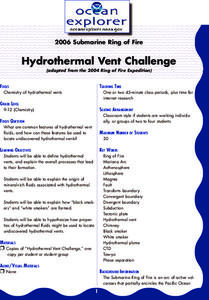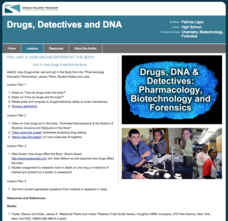Curated OER
Tour of the Solar System
Learners engage in science, math, and language activities as they do research on the components of the solar system. The class begins with some anticipatory activities and discussions before it is divided into small groups to conduct...
Curated OER
Hydrothermal Vent Challenge
Give our ocean voyagers the "Hydrothermal Vent Challenge!" It is a worksheet that guides them through an exploration of hydrothermal vents and the chemical reactions that occur when lava meets seawater. Using a collection of websites,...
Baylor College
Healthy Homes
Meant to follow a instructional activity about how concentrated air particles can be inside of a building, this resource gets individuals to assess the possible air pollutants in their own homes. They take home a worksheet and circle...
Curated OER
Circle of Life
Here is a well-designed science lesson that shows learners that everything that organisms do in ecosystems, including running, breathing, burrowing, growing, requires energy. After a thorough discussion of their own eating and drinking...
Curated OER
The Water Cycle (Evaporation, Condensation, Precipitation)
The 3 steps of the water cycle, evaporation, condensation, and precipitation, are the focus of this lesson. After a neat demonstration of rain using hot water, a pie tin, and ice cubes, young scientists observe and discuss the elements...
Curated OER
Animals of the Lost City
Begin with a demonstration of exothermic reactions and discussion of chemosynthesis. Your aspiring oceanographers research vent communities and then craft a mural of a vent community. This is a terrific method of introducing learners to...
Desert Discoveries
What's For Dinner?
Youngsters compare the teeth of plant-eating dinosaurs with those of meat-eating dinosaurs. The concepts of herbivore vs. carnivore are also introduced. There is an excellent worksheet embedded in the plan which shows five skulls of...
Curated OER
Voyage: A Journey Through Our Solar System
Thoroughly written, this plan walks you through every detail of having your high school astronomers design scale models of the solar system. Complete instructions on building to scale, lesson procedures, and associated worksheets are all...
Curated OER
Human Body Corp.
Learners investigate body systems by participating in a role-play activity. Third, fourth, and fifth graders pretend that they are an organ or system of the human body, and they must write a letter to the body "corporation" discussing...
Curated OER
Hot and Cold Colors
Students experiment with the color and solar energy absorption. In this color and solar energy absorption lesson plan, students spend two days discussing and experimenting with the concept of energy absorption. They paint cans with...
Curated OER
Sexual Health and Hygiene
By examining harmful health and hygiene practices, teens will be able to determine what is best for their body. Advertisers for health/hygiene products will also be evaluated for "best interest" criteria. The class will begin by...
Curated OER
Dining Out With Fishes and Birds of the Hudson
While this lesson focuses on the birds and fish found on the Hudson River, it could be adapted for use in any classroom. Using a vocabulary list, learners explore the meaning of words like adaptation, habitat, barbel, and more. Then,...
Curated OER
For a Change
Here is a worksheet that has young scientists think about things that been changed as a result of heating and cooling, and if they can be returned to their original form. There are seven scenarios to consider, and they must choose,...
California Academy of Science
The Emperor Penguin's Egg
Here is a game intended for use at home that could easily be adapted to the school environment. The class reads an informational story about emperor penguins and then they watch a clip from the film, March of the Penguins. They focus on...
California Academy of Science
Banishing Bycatch
Bycatch is a sad reality for many sea turtles, dolphins, and sharks; it occurs when they get unintentionally caught in commercial fishing nets. The class plays a game using popcorn and crackers, each child will attempt to catch the...
Polar Trec
Foraging for Fish in a Melting Arctic
How much do you know about the black guillemot of the Arctic region? With great background information, images, and a quick discussion, the class will learn all about the plight of the foraging seabird as they play a fun game. First,...
It's About Time
Concentrating on Collisions
How important is momentum? Pupils investigate and apply the definition of momentum as they conduct analyses during a series of one-dimensional collisions. They infer the relative masses of two objects by carefully staging and predicting...
University of California
You Are What You Eat: Testing for Organic Compounds in Foods
We have all heard that we are what you eat, but what are we eating? An informative lesson opens with a discussion of the foods pupils have recently eaten. Then, young scientists perform four experiments on seven different foods to...
NOAA
Deep-Sea Ecosystems – A Tale of Deep Corals
Many have debated which came first, the chicken or the egg, but this lesson debates which came first, the hydrocarbons or the carbonate reef. After a discussion on deep-sea corals, scholars receive a set of questions to research and...
Chicago Botanic Garden
Greenhouse Gas Emissions – Natural and Human Causes
Part three in the series of seven has pupils discussing the different greenhouses gases, learning about the carbon cycle, and then watching a short video about the carbon cycle. Based on their knowledge, individuals complete a greenhouse...
Royal Society of Chemistry
pH 4: Activity
Sometimes playing games in class isn't a bad thing. Science sleuths evaluate and calculate pH and pOH with an online resource. They then manipulate concentration information and relate it during a series of puzzles.
Kenan Fellows
Unit 3: How Drugs Enter/Exit the Body
The third of a four-part series on Pharmacology teaches scholars how drugs enter and exit the body, how they act inside the body, how they affect the brain, and more. Over the course of the unit, groups complete two labs and one...
Museum of Science
Terrarium
Make a premium terrarium. Learners create a miniature terrarium to study ecosystems. They use a clear container, along with rocks, soil, moss, leaves, woodland plants, earthworms, and bugs to construct their terrariums.
Drexel University
Learning Roomba Module 4: Sensors and Actuators
Introduce your classes to sensors and actuators in robots — specifically to the Roomba. Pupils develop programs that make Roomba utilize its different sensors.

























